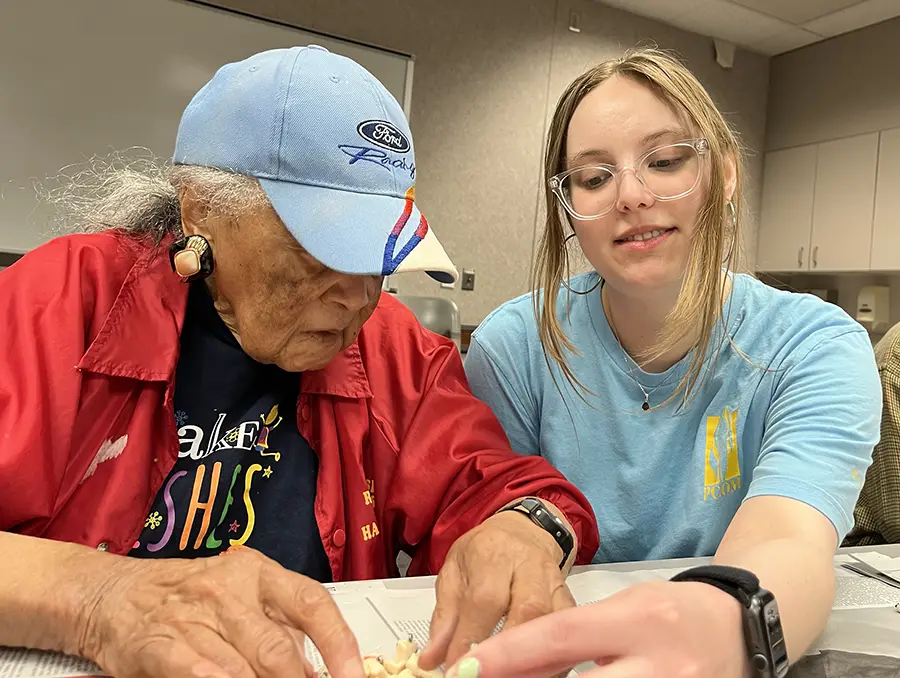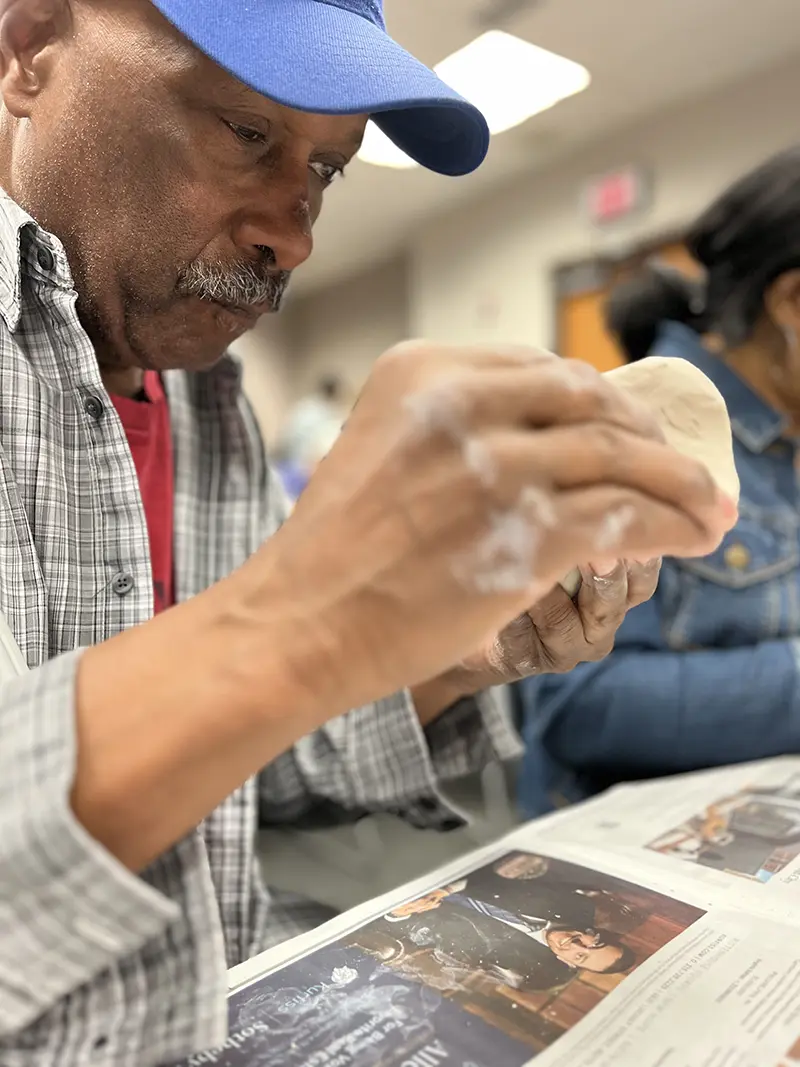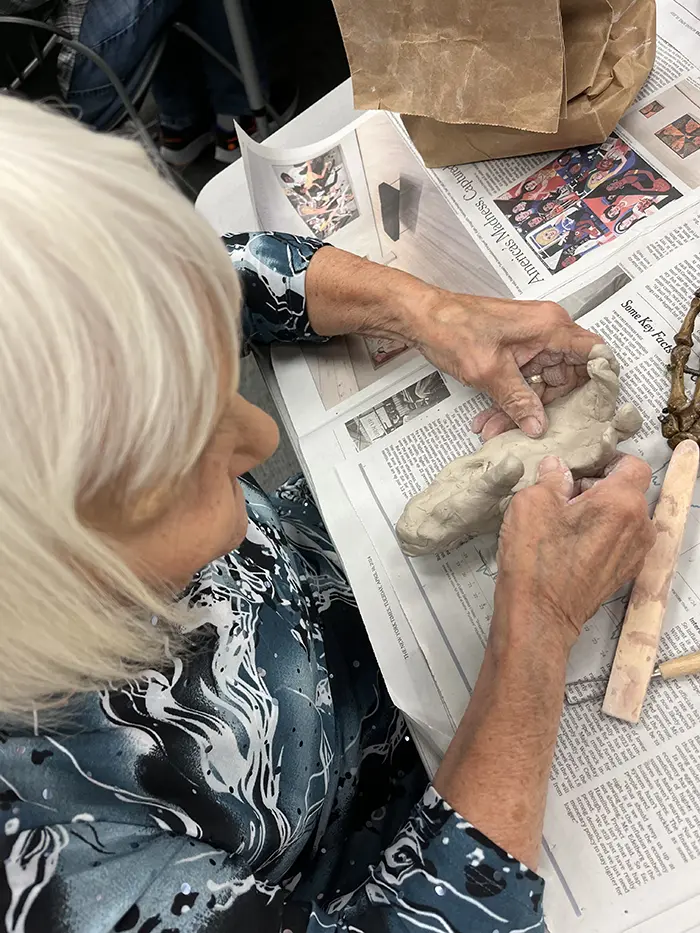Local Visually Impaired Artists Learn about Anatomy from PCOM Students
May 14, 2024First-year Doctor of Osteopathic Medicine (DO) student Megan Sullivan (DO '27) recently sat with LaVera Diggins, a visually impaired
student from Allens Lane Art Center, in a classroom at Philadelphia College of Osteopathic Medicine (PCOM) to discuss how different body parts function.
The goal for the interaction was to have PCOM students like Sullivan help teach visually
impaired Allens Lane art students about anatomy so they could use those learnings
to sculpt a part of the body of their choosing.
Sullivan, who is president of the Coalition for Healthcare, Humanities, and the Arts
(CHHArts) at PCOM, said she was motivated to participate in the community engagement
opportunity because “it's important to get different perspectives from people who
have different lived experiences than you.”
“I’ve been trying to get a picture on what their life is like, how they got here,
and what made them interested in the art class,” Sullivan said, adding that she joined
CHHArts because, “I really wanted to push myself to do something different that is
not medicine related. It's been very fun and very eye-opening, especially with having
an event like this.”
Held in late April, the event was organized by Ruth Conboy, DNP, LPC, Senior Associate,
Director of Counseling for PCOM, CHHArts advisor, and a volunteer for the Allens Lane Art Center's Vision Thru Art program, which for more than 30 years has offered sculpture classes for blind and visually
impaired artists.
About a dozen Vision Thru Arts students, led by instructor Zipora Schulz, met about
that number of PCOM students with interests in anatomy, ophthalmology and the arts.
The two groups of students visited PCOM's anatomy lab and then discussed parts of
the body using elements such as a replica skull so that the visually impaired students
could feel what they may be interested in sculpting. From there, the art students
sculpted various body parts or bones that would later be fired and glazed.
With a passion for melding art and science, Conboy said the event “was better than
I thought it would be because we've had such a robust response from the medical students
as well as Vision Thru Art students.”
“I'm so excited about the collaboration and the opportunity for each set of students
to learn from the other,” she added. “It's wonderful to see the students working together
and learning from each other.”
Betsy Clayton lost her sight later in life and has been part of Vision Thru Art for
decades. Now in her mid-80s and a prolific and talented artist, Clayton sculpted a
hand during the event. She said her PCOM student partner, Drew Monteleone-Haught (DO
'27), president of the Ophthalmology Club, “was so knowledgeable and so willing to
tell me everything” about anatomy.
“I cannot tell you how much fun I had there,” she said. “I love to learn new things.”
About Philadelphia College of Osteopathic Medicine
Established in 1899, Philadelphia College of Osteopathic Medicine (PCOM) has trained
thousands of highly competent, caring physicians, health practitioners and behavioral
scientists who practice a “whole person” approach to care—treating people, not just
symptoms. PCOM, a private, not-for-profit accredited institution of higher education,
operates three campuses (PCOM, PCOM Georgia and PCOM South Georgia) and offers doctoral degrees in clinical psychology, educational psychology, osteopathic
medicine, pharmacy, physical therapy, and school psychology. The college also offers
graduate degrees in applied behavior analysis, applied positive psychology, biomedical
sciences, forensic medicine, medical laboratory science, mental health counseling,
physician assistant studies, and school psychology. PCOM students learn the importance
of health promotion, research, education and service to the community. Through its
community-based Healthcare Centers, PCOM provides care to medically underserved populations.
For more information, visit pcom.edu or call 215-871-6100.
Contact Us
For general media inquiries, please contact the Office of Marketing and Communications
at 215-871-6300 or communications@pcom.edu. Visit our media relations page to view contact information for public relations personnel.
Connect with PCOM

 First-year
First-year  “I’ve been trying to get a picture on what their life is like, how they got here,
and what made them interested in the art class,” Sullivan said, adding that she joined
CHHArts because, “I really wanted to push myself to do something different that is
not medicine related. It's been very fun and very eye-opening, especially with having
an event like this.”
“I’ve been trying to get a picture on what their life is like, how they got here,
and what made them interested in the art class,” Sullivan said, adding that she joined
CHHArts because, “I really wanted to push myself to do something different that is
not medicine related. It's been very fun and very eye-opening, especially with having
an event like this.” “I'm so excited about the collaboration and the opportunity for each set of students
to learn from the other,” she added. “It's wonderful to see the students working together
and learning from each other.”
“I'm so excited about the collaboration and the opportunity for each set of students
to learn from the other,” she added. “It's wonderful to see the students working together
and learning from each other.”